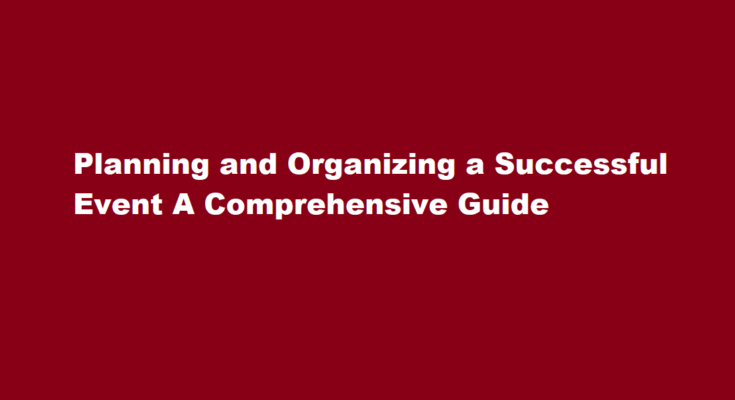Introduction
Hosting a successful event requires meticulous planning and organization to ensure it runs smoothly and leaves a lasting impression on attendees. Whether it’s a corporate conference, a community fundraiser, a wedding, or any other special occasion, careful preparation is the key to success. In this article, we will provide a step-by-step guide on how to plan and organize a successful event that captivates and delights guests.
Define the Purpose and Objectives
The first crucial step in event planning is to define the purpose and objectives of the event. Determine the main goal, whether it’s to raise funds for a charity, launch a product, celebrate a milestone, or educate participants. Identifying specific objectives will guide the planning process and help measure the event’s success later on.
Set a Realistic Budget
Establish a detailed budget that covers all aspects of the event, including venue rental, catering, decorations, marketing, and any other necessary expenses. Allocate funds wisely, focusing on areas that will have the most significant impact on the event’s success. Be prepared to adjust the budget as needed during the planning process.
Create a Timeline
Develop a detailed timeline that outlines all the tasks and milestones leading up to the event. Break down the planning process into manageable stages and set deadlines for each task. This will help you stay organized and avoid last-minute rush and panic.
Assemble a Competent Team
A successful event requires a dedicated and competent team. Assign specific roles and responsibilities to team members based on their strengths and expertise. Regularly communicate and hold meetings to ensure everyone is on the same page and progress is being made according to the timeline.
Choose the Perfect Venue
The venue can significantly impact the atmosphere and overall experience of the event. Consider factors such as capacity, location, accessibility, amenities, and ambiance when selecting the venue. Visit potential locations in person and negotiate the best deal within your budget.
Plan Engaging Content and Activities
Craft a program that aligns with the event’s purpose and engages the attendees. Include a mix of speakers, workshops, entertainment, and interactive activities to keep participants interested and enthusiastic. Be mindful of the event’s duration and schedule breaks to prevent attendee fatigue.
Secure Quality Vendors
Reliable vendors can make or break an event. Research and select reputable vendors for catering, audio-visual services, decorations, and other event essentials. Request quotes, read reviews, and ensure all agreements are documented in contracts to avoid misunderstandings later.
Promote the Event
A successful event needs proper promotion to attract attendees. Utilize various marketing channels, such as social media, email campaigns, posters, and word-of-mouth to create buzz and increase visibility. Collaborate with partners, sponsors, and influencers to expand the event’s reach.
Implement Effective Registration and Check-in Procedures
Streamline the registration process for attendees by offering online registration options. Provide clear instructions and necessary information, such as event schedules and location details. On the day of the event, organize a smooth check-in process to welcome guests warmly and efficiently.
Monitor and Adjust
During the event, pay close attention to how things are progressing. Be prepared to handle any unexpected challenges that may arise. Seek feedback from attendees and gather data on the event’s success against the defined objectives. Use this information to improve future events and make adjustments where necessary.
FREQUENTLY ASKED QUESTIONS
What makes an event successful?
It’s often been said that the success of anything stems from good planning. So, if you’re wondering what makes an event successful, then the best way to start is by making sure it is planned meticulously, comprehensively and accurately. And that means getting things moving well in advance.
What is an event checklist?
An event checklist is a document that outlines all the tasks and activities that need to be completed before, during, and after an event. It is a crucial tool for event planning experts as it ensures that all aspects of the event are covered, from the venue and vendors to the guest list and decorations.
Conclusion
Planning and organizing a successful event requires careful attention to detail, strategic thinking, and effective communication. By defining clear objectives, setting a realistic budget, assembling a competent team, and executing a well-thought-out plan, you can create an event that not only meets but exceeds expectations. Remember, flexibility and adaptability are key traits of successful event planners, so be ready to pivot if necessary. With thorough preparation and dedication, your event is sure to be a memorable and enjoyable experience for all involved.
Read Also : Navigating The Digital Sphere A Guide to Using Social Media Responsibly and Safely



